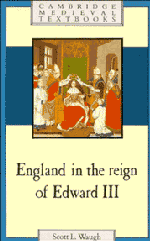Book contents
- Frontmatter
- Contents
- List of figures and tables
- Acknowledgements
- Map 1 Towns and villages mentioned in Chapters 3–6
- Map 2 Ecclesiastical sites mentioned in Chapter 9
- Part I Overview
- 1 Introduction
- 2 Survey of events 1307–1377
- Part II Economic challenges
- Part III Government and communities
- Part IV Politics
- Glossary
- Bibliography
- Index
1 - Introduction
Published online by Cambridge University Press: 05 June 2012
- Frontmatter
- Contents
- List of figures and tables
- Acknowledgements
- Map 1 Towns and villages mentioned in Chapters 3–6
- Map 2 Ecclesiastical sites mentioned in Chapter 9
- Part I Overview
- 1 Introduction
- 2 Survey of events 1307–1377
- Part II Economic challenges
- Part III Government and communities
- Part IV Politics
- Glossary
- Bibliography
- Index
Summary
As it is said that running water is the most powerful thing that can be, because all the particles of water take effect equally in the current, wherefore water pierces the hard rock; just so it is with a nation which exerts itself with a single spirit to maintain the dignity of its lords, who desire nothing but the welfare of the community and individually follow no other design.
(Scalacronica)For a generation between 1330 and 1370 England was exceptionally unified and with a ‘single spirit’ achieved some of the greatest military victories of the middle ages. The image of Edward III and his time is inextricably linked to war. Crécy, Calais, and Poitiers, the Black Prince, Henry of Lancaster, and John Chandos, and Edward himself bring to mind valour and chivalry and have occupied centre stage in most histories of the period.
Yet the domestic backdrop is equally compelling. Edward's military accomplishments are especially impressive because they occurred at a time of remarkable change. The first half of the century saw pitiful harvests, famine, and severe deflation in quick succession. Then the Black Death struck, not just in 1348, but again in 1360, 1373, and periodically thereafter. The resulting drop in population, loss of tenants, and rise in wages battered the economy that undergirded lordship and government. Crime and corruption sparked anxiety and protest. These dislocations made the difficult job of mobilizing manpower and wealth even more formidable than in ordinary times.
- Type
- Chapter
- Information
- England in the Reign of Edward III , pp. 3 - 9Publisher: Cambridge University PressPrint publication year: 1991

